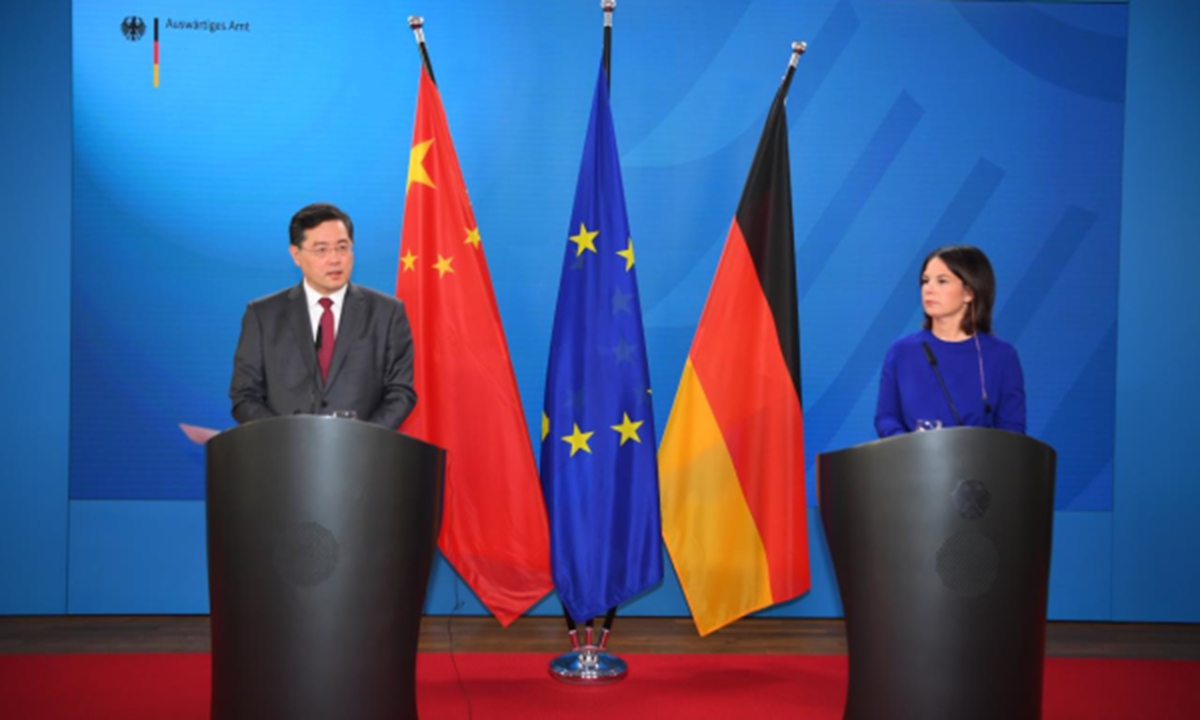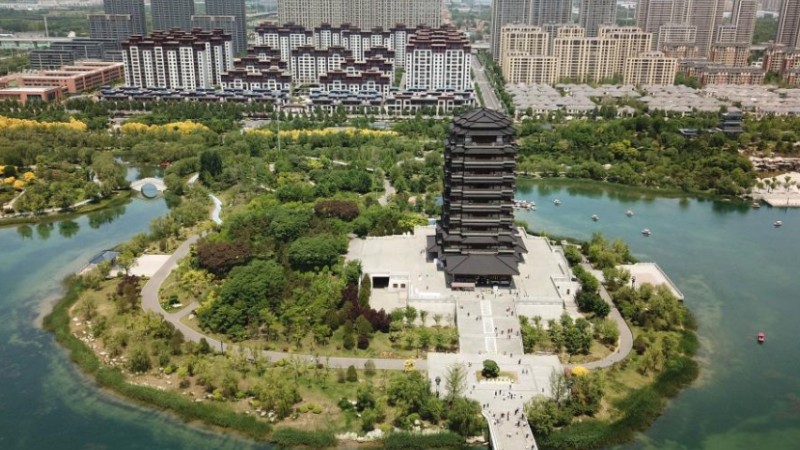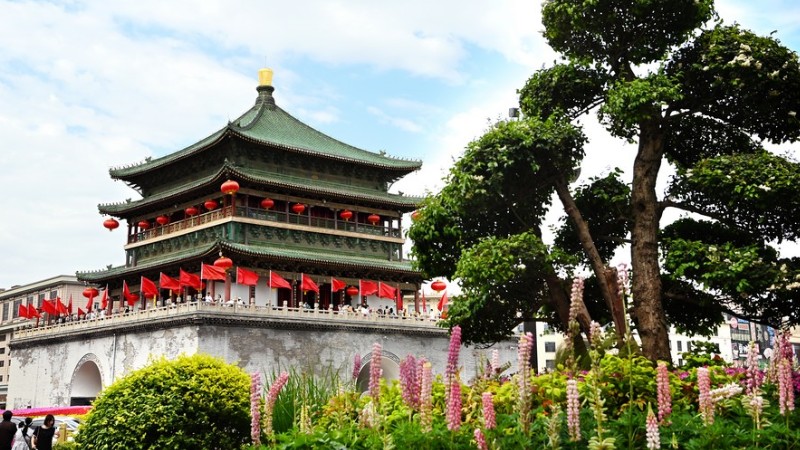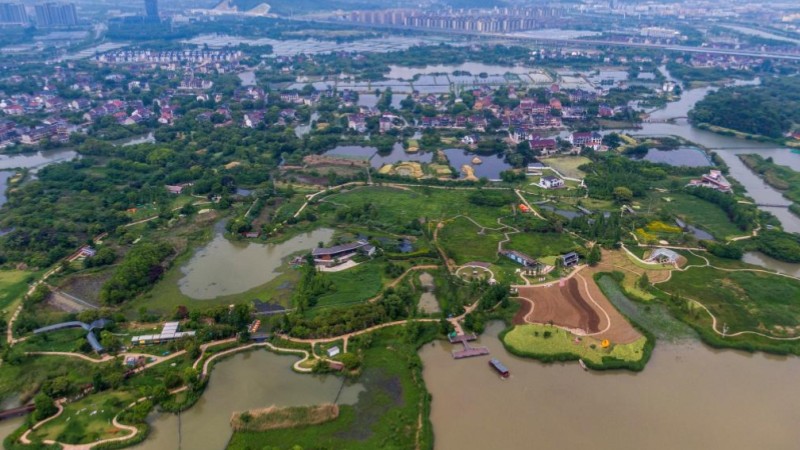Europe will be less confused, entangled if it listens to what China says

Chinese State Councilor and Foreign Minister Qin Gang (left) and German Foreign Minister Annalena Baerbock attend a joint press conference in Berlin, Germany on May 9, 2023. Photo: The Chinese Foreign Ministry
Chinese State Councilor and Foreign Minister Qin Gang is on his visit to Germany, France, and Norway from May 8 to 12 at the invitation of their foreign ministers. Against the backdrop of European leaders' visits to China in recent months, Qin's visit to Europe further implements the consensus reached by China-Europe head-of-state diplomacy and continues to strengthen dialogue and trust between the two sides. This signal is clear and welcomed by the world, as EU Ambassador to China Jorge Toledo said that Qin's visit was a welcome step for both China and Europe.
The main theme of Qin's visit is to further promote bilateral practical cooperation. His visit to Germany mainly aimed to prepare for the seventh round of inter-governmental consultation between the two countries. This will be the first offline inter-governmental consultations between the two sides since the outbreak of the pandemic and it is also the first comprehensive engagement between the two countries' new governments, the great significance of which is self-evident. German Chancellor Olaf Scholz responded positively, saying that he is very much looking forward to the consultation and Germany is making active preparations. In addition, the two sides agreed to step up coordination in multilateral fields and strengthen cooperation on COP28 and biodiversity.
The situation is the same in France, where the two sides mentioned they should keep close high-level exchanges and expand exchanges at all levels. French Foreign Minister Catherine Colonna also reiterated her stance of attaching great importance to economic relations with China and not engaging in bloc confrontation. Next year marks the 70th anniversary of the establishment of diplomatic relations between China and Norway, and it is believed that Qin's visit to Norway will be a journey to consolidate mutual trust and promote cooperation.
Currently, Europe is undergoing a big reflection and debate on its perception and strategy toward China. Various arguments and opinions are being fiercely contested. At this time, China's new foreign minister arrived in Europe to make a clear, firm, and targeted clarification regarding China's stance, attitude, and interests. This is equivalent to injecting a powerful positive energy into this great debate and allowing Europeans to feel China's sincerity and goodwill at close range. This helps Europe to establish a correct understanding of China and maintain rationality without going off course. Using pragmatic cooperation to add value to bilateral relations, while rationally and calmly addressing the divergences between the two sides, and timely controlling damage in specific fields, this is what mature diplomacy should look like.
During Qin's visit to Europe, the German government approved China COSCO Shipping Corporation's purchase of stake in a Hamburg port-based container terminal on May 10. The German side eventually green-lighted the project, which is a relatively positive signal for both China-Germany and China-Europe relations. However, it's exposed by the media recently that the European Commission proposed sanctions against seven Chinese companies for their alleged sales of equipment that could be used to support Russia's military operations against Ukraine. A Chinese diplomat wrote on social media that "while China is making every effort to promote peace which is in Europe's interest, Europe gives a stab in the back in return, bullying China on economic issues. Can't understand what Europe is up to." More accurately, it is some anti-China forces in Europe that are stabbing China in the back, and this is not the first time they have done so.
From these two issues, we can see the duplicity and complexity of Europe's China policy. The friendly and rational forces in Europe toward China are in a defensive position now. Some Europeans already have deep misunderstandings and misconceptions about China, and they are further influenced by the toxic public opinion in the US and the West today, which further worsens the atmosphere of China-Europe relations.
In summary, there are four main problems in the China-Europe relationship: an unnecessary "Ukraine knot," a dangerous impulse of the Europe to interfere in China's internal affairs, especially the Taiwan question, wrong judgment that deems the interdependence of China-Europe economic and trade relations as a "risk," and submission and dependence on Washington's comprehensive containment strategy against China. Qin focused on these four issues in his communication with the European side, and it is worth mentioning that all the four issues are rooted in some Europeans' one-sided, narrow, and paranoid subjective cognition. As long as Europeans change their perspective and view these issues from a strategic and long-term angle, they can be easily resolved. Some Europeans are currently in an blind alley, and it may be difficult to persuade them to turn back if they aren't taught some lessons. We may need more patience to wait for them to wake up on their own.
The public also pays attention to Qin's positive response to Europe's "de-risking" approach against China. "If the EU seeks to decouple from China in the name of 'de-risking,' it will decouple from opportunities, cooperation, stability, and development," Qin said. Although China-Europe relations have encountered headwinds for a period of time, from January to March, French and German investment in China increased by 635.5 percent and 60.8 percent respectively compared to the same period last year. This is the power of the law. Without political interference from some Europeans, Europe will become more independent and secure due to prosperous foreign cooperation. China-Europe relations need more confidence and ambition, and setting bottom lines and red lines should not be the goal of both sides. China-Europe relations can also have "no limits." If Europe truly listens to China's words, it will be less confused and entangled.
Photos
Related Stories
- China's Zhejiang strives to boost trade ties with central, eastern European countries
- China supports Europe's strategic autonomy: FM
- China-Europe freight train routes via Xinjiang's Alataw Pass increase to 104
- China, Central and Eastern Europe see closer economic ties
- China's land port handles over 1,000 China-Europe freight trains
Copyright © 2023 People's Daily Online. All Rights Reserved.









